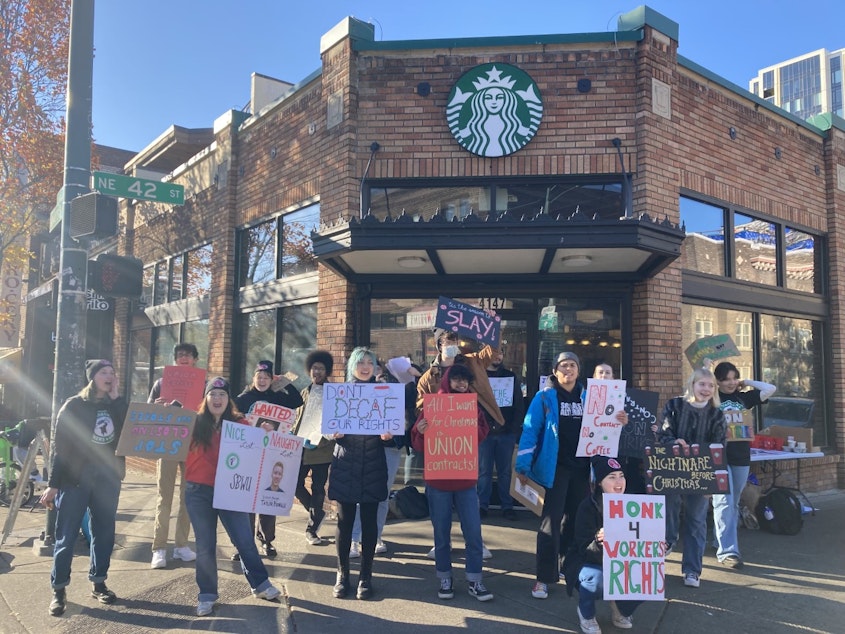'Short staffing equals venti wait times': Seattle Starbucks employees join nationwide strike

Workers at more than 100 Starbucks stores in 25 states are picketing in what's being called the largest labor action since employees started their unionizing campaign.
The walkout on Thursday coincides with the Seattle coffee giant's annual Red Cup Day, when customers who order holiday drinks get special reusable cups. They're considered collector's items and customers line up at the crack of dawn to get their hands on a decorated cup. It's one of Starbucks' most profitable days on the calendar.
Daisy Federspiel-Baier is a shift supervisor at a Starbucks in Seattle's University District. She says the strike is necessary because Starbucks has not been bargaining in good faith with its unionized employees.
"They said that they would, but every single time we have entered a bargaining room, they have left within 15 minutes," Federspiel-Baier says. "Additionally, we have been really short-staffed, and we are protesting not having enough labor."
That may be especially true on what Federspiel-Baier says is her store's busiest day of the year.
"Short staffing equals venti wait times," she says.
Sponsored
Staffing is just one of the issues that Starbucks Workers United representatives say prompted them to launch the so-called Red Cup rebellion.
According to the Starbucks Workers Union, the company has retaliated against union leaders, and Starbucks lawyers have walked out on bargaining sessions or made last-minute rescheduling requests that make it challenging for members to participate.
But A.J. Jones, an executive vice president of communications for Starbucks, disputed that allegation in comments to NPR.
"Nothing could be further from the truth," Jones told NPR, adding that the company has provided Starbucks Workers United with ample notice of bargaining session letters.
Jones said the company has probably been "overly aggressive" in trying to schedule bargaining sessions. The problem with recent talk breakdowns, he said, is that union leaders at the table want to record or broadcast negotiation talks on social media — a legal no-no.
Sponsored
"Under the National Labor Relations Act, you are not allowed to record bargaining sessions. And that actually is a clear violation of the act because of what's being discussed."
In an email to KUOW, a Starbucks spokesperson acknowledged the demonstrations "at a small number of our U.S. company-owned stores."
"In those locations where partners choose to participate, we respect their right to engage in lawful protest activity – though our focus has been, and continues to be, on uplifting the Starbucks experience for our partners and customers," the spokesperson says. "In those stores where partners have elected union-representation, we have been willing and continue to urge the union to meet us at the bargaining table to move the process forward in good faith."
But Daisy Federspiel-Baier, at the University District location, says its hard for her to believe the company is willing to meet in good faith when bargaining sessions have gone awry.
"I don't feel heard," she says. "I know a lot of people don't feel heard. They won't even let us get to [our] proposals. We have them written out and ready to go, but they won't listen."
Workers at Starbucks stores in Capitol Hill and Downtown Seattle also participated in Thursday's demonstration.




